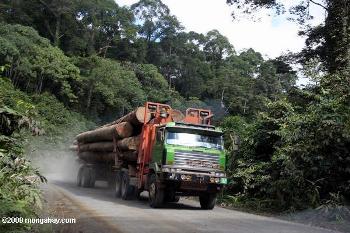The Association for Tropical Biology and Conservation (ATBC) has condemned Malaysia’s booming practice of converting tropical forests into rubberwood plantations, arguing that the conversion threatens Malaysia’s biodiversity, endangered species, and releases significant greenhouse gas emissions.
According to a resolution, rubberwood plantations in Malaysia have expanded nearly 30-fold in three years from 1,626 hectares to 44,148 hectares last year. Such plantations will be tapped for latex for 15 years before the entire plantation is logged for timber. It is estimated that rubberwood plantations could expand to 1.2 million hectares in Malaysia alone.
“Further conversion of tropical forests to exotic plantation monocultures will result in large-scale damage to native plants and wildlife, increased greenhouse gas emissions from deforestation, downstream flooding and stream damage, and the decline of other important ecosystem services,” the ATBC scientists write. The organization is the world’s largest professional society devoted to the study and conservation of tropical forests with thousands of members spanning over 100 nations.
 Truck carrying logs out of a Malaysian rainforest. Photo by: Rhett A. Butler. |
The conversion also goes against many of the Malaysian government’s policies, according to the ATBC. In 1992 the Malaysian government pledged that at least half of Malaysian land would remain under permanent forest cover, and that national forest management must consider the conservation of biodiversity.
ATBC’s resolution “urges the Government of Malaysia to protect its remaining tropical forests […] and to effect an immediate moratorium on conversion of such forests to rubberwood and other timber plantations.”
In addition the government should seek alternative revenue for its natural forests from programs like Reduced Emissions from Deforestation and Forest Degradation (REDD) and Payments for Environmental Services (PES).
As of 2005 just over 60 percent of Malaysia was under forest cover, though only 11.6 percent was considered ‘pristine’. The Southeast Asian nation lost on average 140,200 hectares of forest every year between 2000 and 2005: the rate of deforestation accelerating by 85 percent since the 1990s, giving Malaysia the highest jump in forest destruction worldwide. According to 2005 data over 1.5 million hectares of Malaysia is plantations, comprising 7.5 percent of its forest cover.
Related articles
Commodity trade and urbanization, rather than rural poverty, drive deforestation

(02/07/2010) Deforestation is increasingly correlated to urban population growth and trade rather than rural poverty, suggesting that measures proposed to reduce deforestation will be ineffective if they fail to address demand for commodities produced on forest lands, argues a new paper published in Nature GeoScience.
Cheerios maker linked to rainforest destruction
(01/19/2010) An activist group linked General Mills to destruction of rainforests in Southeast Asia in dramatic fashion on Tuesday, when it unfurled a giant banner, reading “Warning: General Mills Destroys Rainforests”, outside the company’s Minneapolis headquarters building.
Malaysia to allow logging in indigenous ‘peace park’ to proceed
(12/17/2009) Malaysia, the country with the fastest rate of greenhouse gas emissions growth since 1990 among middle and upper income countries, will allow logging to proceed in a contested rainforest area in Sarawak, on the island of Borneo.